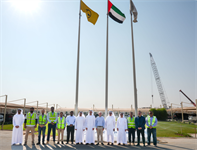
Landmark Progress in Dubai’s Renewable Energy Sector: The Sixth Phase of Mohammed bin Rashid Al Maktoum Solar Park
In a significant stride towards a sustainable future, Dubai Electricity and Water Authority (DEWA) has unveiled remarkable advancements in the sixth phase of the Mohammed bin Rashid Al Maktoum Solar Park. This ambitious initiative is not merely an engineering feat; it exemplifies Dubai’s commitment to leading global efforts in renewable energy production. As the world grapples with climate change and its far-reaching implications, the launch of this new phase brings a beacon of hope, symbolizing the fusion of technology, sustainability, and economic viability.
The sixth phase of the solar park has garnered attention for achieving a historic milestone—recording the world’s lowest energy production cost of just .6215 cents per kilowatt-hour (kWh). This achievement is particularly noteworthy considering the solar energy sector’s rapid evolution and competitive landscape. The implementation of advanced bifacial photovoltaic technology represents a paradigm shift in energy generation, allowing for more efficient use of solar resources by capturing sunlight from both the front and back sides of solar panels.
DEWA’s commitment to innovation is further underscored by the project’s strategic partnership with Abu Dhabi Future Energy Company, Masdar. Together, the two powerhouses control the operations of the project, with DEWA holding a 60% stake while Masdar owns the remaining 40%. The collaboration employs single-axis tracking systems, enhancing the ability of the panels to follow the sun’s path, thus maximizing energy capture throughout the day.
Covering an expansive 20 square kilometers, the sixth phase is projected to generate clean energy sufficient to power approximately 540,000 homes. With an anticipated annual reduction of 2.36 million tonnes of carbon emissions, this phase aligns seamlessly with Dubai’s broader environmental ambitions. These initiatives form a crucial part of both the Clean Energy Strategy 2050 and the Net Zero Carbon Emissions Strategy 2050, which aspire to transform Dubai into a global center for sustainable energy and innovation.
Saeed Mohammed Al Tayer, DEWA’s Managing Director and CEO, recently visited the solar park to assess progress on this transformative project. Accompanied by senior officials, including Waleed Bin Salman, Executive Vice President of Business Development and Excellence at DEWA, Al Tayer expressed satisfaction with the advancements made thus far. He emphasized that the park is an integral component of Dubai’s ambitious plan to produce 100% of its energy from clean sources by 2050.
Currently, the Mohammed bin Rashid Al Maktoum Solar Park boasts a total production capacity of 2,860 megawatts (MW). With the completion of the sixth phase expected in 2026, this capacity will escalate to an impressive 4,660 MW. By 2030, DEWA aims for clean energy to account for 27% of Dubai’s total power generation. This trajectory not only demonstrates economic foresight but also sends a clear message about the Emirate’s resolve to combat climate change through innovative solutions.
The socio-economic impact of the solar park extends beyond mere energy production. It stands as a testament to Dubai’s ingenuity and resilience, promising new jobs and opportunities within the green sector. The project reflects a fundamental shift towards sustainable development, showcasing how cutting-edge technology can coexist with environmental stewardship.
In a world increasingly facing the daunting complexities of climate change, the sixth phase of the Mohammed bin Rashid Al Maktoum Solar Park serves as an inspirational model. It illustrates not only the potential for affordable and renewable energy solutions but also the essential role that collaborative partnerships can play in driving global efforts towards sustainability. As nations around the world strive to meet their climate goals, Dubai’s commitment to its renewable energy initiatives positions it as a leader in the movement towards a cleaner future.
As we look to the future, the successful implementation of this solar park may herald a new era in which energy production is harmoniously aligned with environmental responsibility, benefiting both the economy and the planet.
—
Tags: #UAE #EconomyNews #EnvironmentNews

